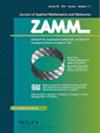Nanofluid turbulent flow inside a duct equipped with disturber with new shape
IF 3.2
4区 工程技术
Q1 MATHEMATICS, APPLIED
Zamm-zeitschrift Fur Angewandte Mathematik Und Mechanik
Pub Date : 2023-09-22
DOI:10.1002/zamm.202200201
引用次数: 0
Abstract
Abstract To intensify the productivity of solar systems, researchers utilized a perforated tape with obstacles in a circular tube filled with nanomaterial. ANSYS FLUENT was used to simulate the results, combining K‐ε approach and a homogeneous approach for the nanomaterial. Grid size was optimized to reduce computation costs, and the accuracy of the simulation was verified using previously published data. The simulations considered the height of the disturber and the revolution as parameters. The insertion of the disturber increases the impingement with the wall, resulting in a colder outer wall. Although the use of the tape increases convection, resistance with the wall also increases. Therefore, a perforated tape shape was used with obstacles to intensify rotational velocity. Increasing the height and number of revolutions can enhance velocity by 4.58% and 7.04%, respectively. Meanwhile, as the values of N and Re increase, the temperature decreases by 2.1% and 0.11%, respectively.安装新型扰流器的管道内纳米流体湍流
为了加强太阳系的生产力,研究人员在填充纳米材料的圆形管中使用了带障碍物的穿孔带。采用ANSYS FLUENT软件,结合K‐ε法和均匀法对纳米材料进行模拟。优化网格大小以降低计算成本,并使用先前发表的数据验证模拟的准确性。仿真以扰动器高度和转速为参数。扰流器的插入增加了与壁面的碰撞,导致外壁面变冷。虽然胶带的使用增加了对流,但与墙体的阻力也增加了。因此,采用带障碍物的穿孔带形来增强旋转速度。增加高度和转数可使速度分别提高4.58%和7.04%。同时,随着N和Re值的增加,温度分别下降2.1%和0.11%。
本文章由计算机程序翻译,如有差异,请以英文原文为准。
求助全文
约1分钟内获得全文
求助全文
来源期刊
CiteScore
3.30
自引率
8.70%
发文量
199
审稿时长
3.0 months
期刊介绍:
ZAMM is one of the oldest journals in the field of applied mathematics and mechanics and is read by scientists all over the world. The aim and scope of ZAMM is the publication of new results and review articles and information on applied mathematics (mainly numerical mathematics and various applications of analysis, in particular numerical aspects of differential and integral equations), on the entire field of theoretical and applied mechanics (solid mechanics, fluid mechanics, thermodynamics). ZAMM is also open to essential contributions on mathematics in industrial applications.

 求助内容:
求助内容: 应助结果提醒方式:
应助结果提醒方式:


